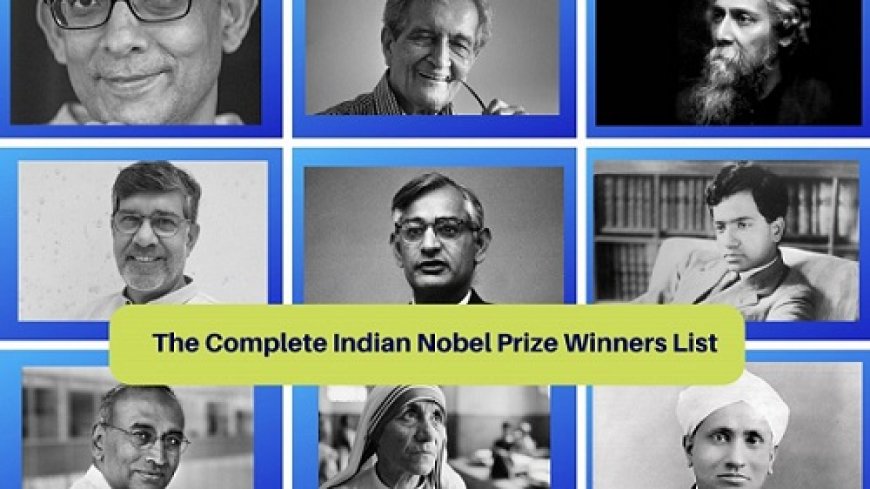Nobel Prize Winners in India

The Nobel Prizes
The Nobel Prizes are a set of annual international awards that are bestowed in recognition of academic, cultural, and scientific advances in several categories. The Nobel Prizes are regarded as the most prestigious awards in their respective fields. The Nobel Prizes were established by the will of Alfred Nobel, a Swedish inventor and businessman, and are awarded each year on December 10th, the anniversary of Nobel's death. The prizes are administered by the Nobel Foundation, which is headquartered in Stockholm, Sweden. According to Alfred Nobel's will of 1895, are awarded to "those who, during the preceding year, have conferred the greatest benefit to humankind." The first Nobel Prize was presented in 1901. Rabindranath Tagore was the first Indian citizen to be awarded and also first Asian to be awarded in 1913. Mother Teresa is the only woman among the list of recipients.
There are six Nobel Prizes, which are awarded in the following categories:
- Nobel Prize in Physics
- Nobel Prize in Chemistry
- Nobel Prize in Physiology or Medicine
- Nobel Prize in Literature
- Nobel Peace Prize
- Nobel Memorial Prize in Economic Sciences
India has had several Nobel Prize winners in different fields. Here are the Nobel Prize winners from India:
- Rabindranath Tagore - Literature, 1913
- CV Raman - Physics, 1930
- Har Gobind Khorana - Medicine, 1968
- Mother Teresa - Peace, 1979
- Subrahmanyan Chandrasekhar - Physics, 1983
- Amartya Sen - Economics, 1998
- Venkatraman Ramakrishnan - Chemistry, 2009
- Kailash Satyarthi - Peace, 2014
- Abhijit Banerjee - Economics, 2019
CV Raman in Physics, 1930
CV Raman was an Indian physicist who won the Nobel Prize in Physics in 1930 for his work on the scattering of light and the discovery of the "Raman effect". The Raman effect is the inelastic scattering of a photon by molecules, which results in a change in the energy of the photon and the molecule.
Raman's work demonstrated that when light is passed through a substance, some of the photons are scattered in a different direction and with a different wavelength than the incident photons. This phenomenon provided a new method for studying the structure of molecules and laid the foundation for the field of Raman spectroscopy.
Har Gobind Khorana in Medicine, 1968
Har Gobind Khorana was an Indian-American biochemist who won the Nobel Prize in Medicine in 1968 for his work on the genetic code and its role in protein synthesis. Khorana's research focused on how the sequence of nucleotides in DNA determines the sequence of amino acids in proteins.
In the early 1960s, Khorana and his colleagues were able to synthesize nucleotides with specific sequences, which allowed them to decipher the genetic code and determine how the four-letter DNA code is translated into the 20-letter amino acid code of proteins. This work paved the way for the development of new methods for synthesizing and analyzing DNA and opened up new avenues of research in molecular biology and biotechnology.
Mother Teresa in Peace, 1979
Mother Teresa was a Catholic nun who won the Nobel Peace Prize in 1979 for her work with the poor and destitute in India. She dedicated her life to serving the most vulnerable members of society, including the sick, the dying, and the homeless. Her work has been recognized for its selflessness and compassion, and she is regarded as one of the most inspirational figures of the 20th century.
Mother Teresa's tireless efforts to alleviate suffering and promote peace have had a profound impact on people around the world.
Subrahmanyan Chandrasekhar in Physics, 1983
Subrahmanyan Chandrasekhar was an astrophysicist who won the Nobel Prize in Physics in 1983 for his work on the structure and evolution of stars. Chandrasekhar's research focused on how the physical properties of stars, such as their mass and temperature, influence their structure and behavior.He showed that when a star uses up all its nuclear fuel, it collapses under its own weight and becomes a white dwarf, a dense object with a size comparable to that of the Earth but a mass comparable to that of the Sun. This work helped to explain the behavior of stars and laid the foundation for the study of compact objects such as neutron stars and black holes.
Amartya Sen in Economics, 1998
Amartya Sen is an Indian economist and philosopher who won the Nobel Prize in Economics in 1998 for his contributions to welfare economics and social choice theory & the measure of the well-being of citizens in developing countries etc.
One of Sen's most influential contributions is the concept of "capability approach," which emphasizes the importance of expanding people's capabilities and freedoms as a central goal of economic development. Sen's work has had a significant impact on development economics and has influenced policies and programs aimed at reducing poverty and improving social welfare around the world. He is also known for his contributions to the study of famine, social choice theory, and ethics.
Venkatraman Ramakrishnan in Chemistry, 2009
Venkatraman Ramakrishnan is a structural biologist who won the Nobel Prize in Chemistry in 2009 for his work on the structure and function of ribosomes. Ribosomes are cellular structures responsible for synthesizing proteins, which are essential for all forms of life.
Ramakrishnan's research focused on using X-ray crystallography to determine the three-dimensional structure of ribosomes, which revealed the molecular mechanisms behind protein synthesis. This work provided a detailed understanding of how ribosomes function and has implications for the development of new antibiotics and other drugs that target bacterial ribosomes. He is also known for his contributions to the study of RNA and the structure of other macromolecules.
Kailash Satyarthi in Peace, 2014
In 2014, Kailash Satyarthi and Malala Yousafzai were jointly awarded the prestigious award ‘for their struggle against the suppression of children and young people and for the right of children to education’. Satyarthi has dedicated his life to advocating for the rights of children and has worked to rescue thousands of children from forced labor and exploitation. His work has involved organizing raids on factories and workshops where children are forced to work, and advocating for stronger laws and policies to protect children's rights. His work has helped to raise awareness about the issue of child labor and has inspired others to take action to promote children's rights and improve the lives of vulnerable children.
Abhijit Banerjee in Economics, 2019
Abhijit Banerjee is an economist who won the Nobel Prize in Economics in 2019, along with Esther Duflo and Michael Kremer, for their experimental approach to alleviating global poverty. Banerjee's research focuses on development economics, including poverty reduction and access to education and healthcare.
Banerjee's research has had a significant impact on the field of development economics and has helped to shape policies and programs aimed at reducing poverty and improving social welfare in many countries around the world. He is also known for his work on the economics of information, labor markets, and political economy.
Malala Yousafzai is the youngest person who has ever won this very valuable award. A young girl who fought against the religious authorities in her country to claim her rights and the rights of millions of other young girls.
What's Your Reaction?






















































